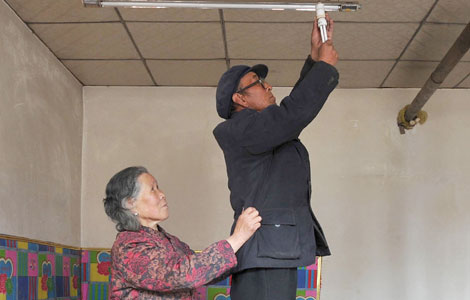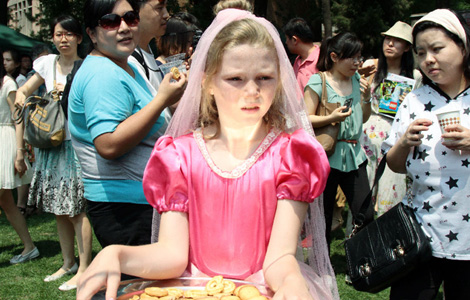Farmers enjoy greener growth in Zunyi
Updated: 2013-05-28 08:14
By Yan Qin (China Daily)
|
|||||||||||
There are more than 2,000 chili pepper dealers, more than 500 household transporters, and two special transport companies in Xiazi, according to Cai Jihong, who heads a 286-member chili pepper cooperative. A Korean business has approached the cooperative, as they want to grow Korean peppers in Xiazi.
Xiazi has been so important in the national chili pepper market that chilies from far-away Xinjiang, Henan, Shandong and Shanxi are now sold there.
In adjacent Meitan, too, local leaders are confident they can make it without damaging ecological excellence.
Their secret?
The eye-catching brown hotel in the shape of a gigantic teapot - "teapot No 1 under heaven", as locals proudly call it, atop Huoyan hill at the heart of the county seat - says it all.
Mou Wei, the county's young chief information officer, made no secret of his aspiration to have Meitan known as "the most beautiful countryside" in China. Meitan is strikingly similar to Wuyuan, a springtime tourist favorite in Jiangxi province, in climate, landscape, and even produce - both are traditional tea-growing areas and present stunning views of rape flowers in spring.
Miles before entering Meitan along highway G326, there are proud posters announcing the county's role as "the cradle of the modern Chinese tea industry". Meitan's tea-planting history dates back to the Tang dynasty (AD 618-907). But it wasn't industrialized until 1939, when the then Kuomintang government built an experimental tea farm there, cultivating a wartime foreign exchange earner. The local government chose to make it a pillar of the local economy in 1979 and it has made leapfrog progress since.
Tea was chosen because it conforms to the county's emphasis on ecological integrity, and it promises three to five times more profits than other crops, according to Tian Weixiang, chief of Meitan's Tea Industry Bureau.
So even Hetaoba, a village with no tea-growing history until the 1980s, has planted 670 hectares.
And tea does deliver. In the 216-people Tianjiagou village, per capita net income was more than 10,000 yuan ($1,616) last year.
Tea has not only enabled villagers to renovate their homes, it has nurtured hundreds of tea-related enterprises. The allure of the tea gardens and their natural surroundings produces tourist revenues, inspiring the local authorities to seriously consider tea-themed sightseeing.
With almost 27,000 hectares of tea farms in 2012, Meitan became the third largest tea-producing county in China.
No wonder the county plans to plant another 40,000 hectares by 2015.
No wonder we saw the tantalizing poster that shouts: "Live a farmer's life in Meitan. Let's go!"
The author is a senior writer with China Daily.
Related Stories
Countryside stores in Guizhou to complete information transformation 2013-05-24 10:18
Guizhou eyes opportunities in HK markets 2013-05-22 14:31
7th Guizhou Tourism Development Conference 2013-05-27 16:01
Economic transformation bears fruit in Guizhou 2013-05-21 08:17
Today's Top News
Germany to pay $1b for ageing Holocaust victims
Beijing seeks cooperation with US on cyberattacks
China to speed up service growth
Infant's fall in pipe probed
Developer invests $1.5b in London
Schoolchildren taught to avoid sexual assault
Traffickers await appeal verdict
Female condoms, a new choice
Hot Topics
Lunar probe , China growth forecasts, Emission rules get tougher, China seen through 'colored lens', International board,
Editor's Picks

|

|

|

|

|

|





